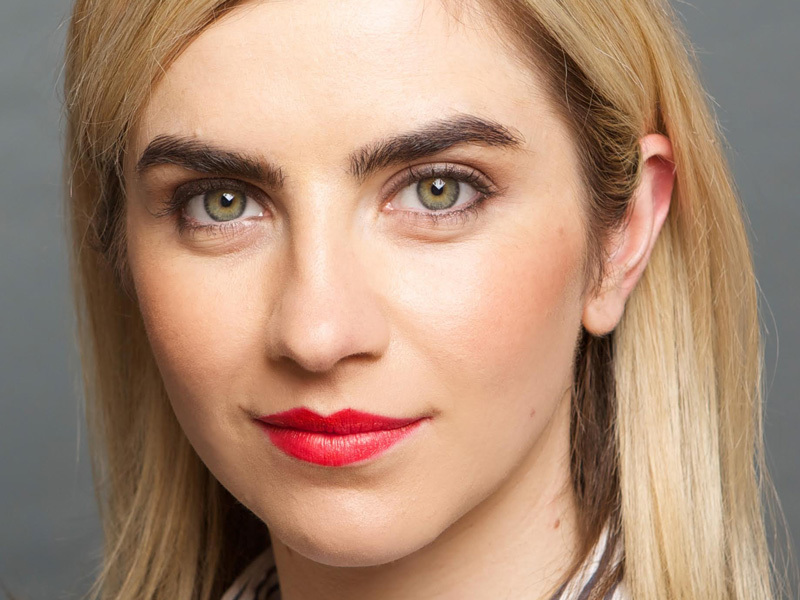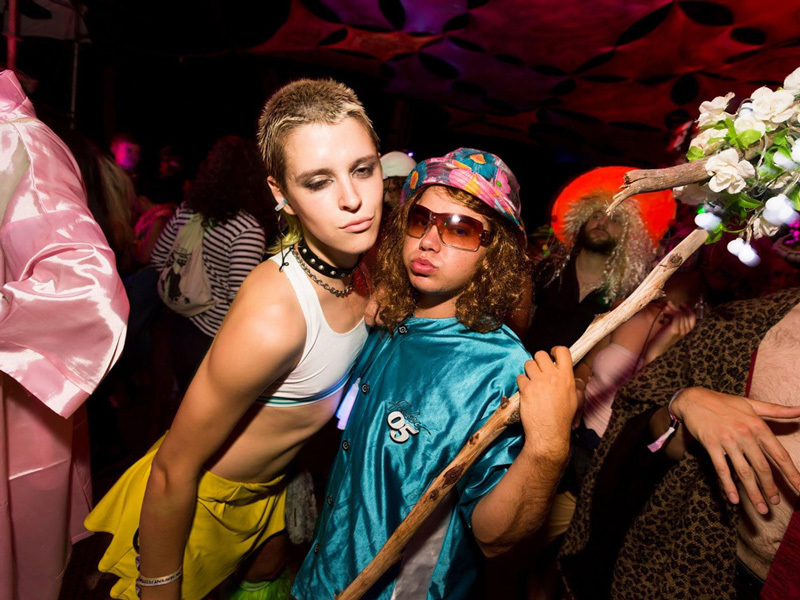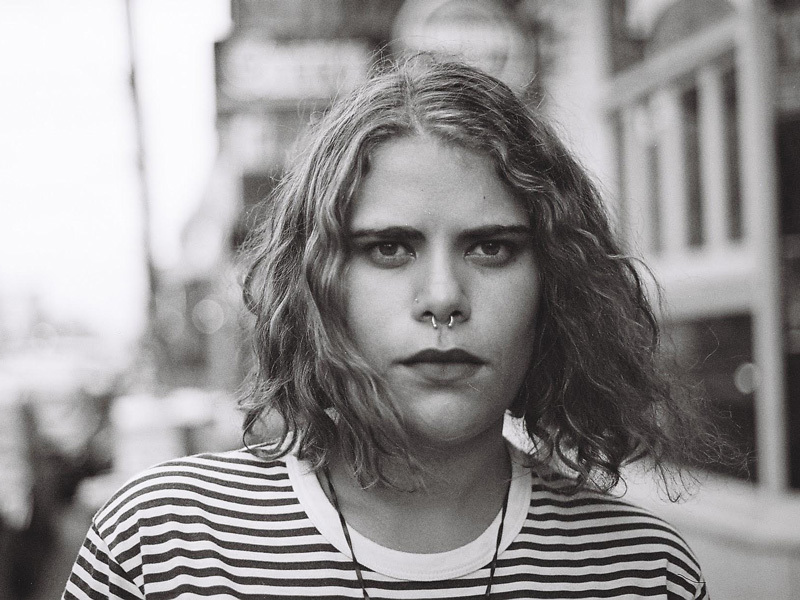Each generation thinks they’re the ones that are going to get it right: Boomers wanted free love, Gen X wanted freedom from Boomers and Millennials, well, we want it all. With a national election looming, the power young Australians have to shape our national identity is stronger than ever.
As a generation raised on the internet, we’re engaged with identity politics and intersectionality in a way that’s never been seen before. We’ve had a public voice since we learnt to login — and we’re not afraid to use it. In this new age of activism we’re leveraging our causes, demonstrations and debates to new populations and taking control of the message.
Nayuka Gorrie
Nayuka Gorrie is a writer and works for The Foundation for Young Australians.
Tell us about yourself.
I’m from the Gunai Kurnai tribe and spent the first five years of my life in Victoria before my family had to flee due to family violence. We ended up in Queensland and lived in a few small towns before moving to Brisbane. I’m the oldest, I’ve got a brother and a sister on my mum’s side and a brother and a sister on my father’s side.
How did you get involved with activism?
I think it’s normal for a lot of Aboriginal and Torres Strait Islander people to care. We’re very community minded; it’s part of our ethos, our kinship connections mean we generally care more for strangers as a cultural value. At 13 I started this cute little volunteering program at what was then called “the special unit” a school for people with learning difficulties. I was like “we need to help!” I wanted to do something — I also started this little Amnesty International in high school. All my role models and the people around me were doing really good shit for the community, it feels very normal to give back.
What issues do you wish were more visible?
There is the stuff you react to and the stuff you get proactive about. A lot of black people have always wanted a treaty, that’s been on the political agenda, but depending on the government it moves around a bit. Self-determination is always the thing that keeps it together and the overarching theme. In saying that though, something we need need to start thinking, talking and mobilising around is violence against black women. Gendered violence in this country is obviously an issue, and right at the very core of it are Aboriginal and Torres Strait Islander women. That is what we need to get angry about.
Do you call yourself an activist?
I used to hate the idea of being called an activist, it felt like a slur. Now I’m comfortable with it because I’ve realised activism can take many forms: it’s not just being out on the streets protesting, it can be in boardrooms and in the media. Wherever there’s power, there can have activism. It’s not just your “tree-huggers” or whatever. I’m becoming more comfortable with the term and it’s been so important for Aboriginal resistance, we need activism.

Nevena Spirovska
Nevena Spirovska is the Secretary of The Australian Sex Party.
Tell us about yourself.
At the moment I’m a young queer woman who lives in Melbourne. I’m lucky enough to work with the fabulous Fiona Patten in her Parliamentary office. I like to sample the very fine wines that Australia has to offer and the great nightlife that usually become the great mornings. I’m living a very active social and political life.
What are the most urgent issues that need representation in Parliament?
What we’d like to see, that other parties aren’t campaigning for, is the legalisation of cannabis for personal use. It’s working overseas, it’s economically a great idea and people are going to continue to smoke marijuana either way. Also, we want churches and other religious institutions to pay their share of tax. We want a truly secular government. We don’t want church and state just to be a catch cry: we want to see a very clear separation. Marriage equality is a bit of a no-brainer and we want to see it legislated now and we want to see abortion legalised across Australia.
What have you learnt from being part of a political party?
The best thing about the Australian Sex Party is that I can truly be myself, it’s a really honest political party. We’re not trying to tell people how to live their lives: we come from the background of the sex industry, we come from the background of drug law reform, we come from the background of civil liberties. I’ve learnt to use the things I’m passionate about to craft policies and make campaigns based on what’s important to people.
How can we communicate the importance of sex worker’s rights to the more conservative parts of the public?
Sex worker’s rights are industrial rights, it should be treated like any other workplace. Sex workers should have the opportunity to pay taxes but also the opportunity to remove stigma and provide safety to their workplaces.
How has the internet changed activism?
It’s fantastic! It’s made activism so much more accessible; now you’re able to contribute in a way you haven’t been able to. Online petitions can effect change and online campaigns can make a difference. It means it’s not just people with access or money who are able to control the discourse — more people can become involved and it empowers them to make a difference like never before.

Brooke Powers and Kai Clancy
Brooke Powers is a DJ and Kai Clancy is a Health Promotion Officer at the Victorian AIDS Council. They’re both active in fighting stigma around addiction.
Tell us about how you crossed paths.
Brooke: I’m a house music DJ. At some point I got a chance to be on TV and talk about drug stigma and harm reduction and that kind of started this whole thing in my life. It’s always been really important to me and something I want to speak out about a lot more. I met Kai, who like me is queer and trans and also has similar experiences with drug use and is also really political about it. We ended up bonding over that.
Kai: I’m a bit of an educator in a sense. I’ve been working as an Aboriginal health promotion officer at the Aids Council, I just resumed that position but I was doing sex education and harm reduction work; teaching Aboriginal people about safe sex practices and safer drug usage.
Brooke, you appeared on the studio discussionAustralians on Drugson ABC2. Tell us about that.
Brooke: It was weird I ended up on the show, I wasn’t well-known or anything. They wanted young people to talk openly about taking drugs and I happened to be Sydney during the weekend they were filming. I didn’t know what to expect. They had 14 people, trying to represent all sides of the drug debate. They did reasonably well, but overall the drug user contingent on the panel didn’t really have a good selection of users. I think they were trying convey that the majority are young people taking lots of Ecstasy. I was the only one on the panel who was a drug user focussed on anti-prohibition and harm reduction. It was a really awesome opportunity, but I think overall the conversation was still from this point of view that drugs were ultimately bad.
How do you want to see people speaking about drugs?
Brooke: The agenda I always want to push is that the most dangerous part about recreational drug use is prohibition. Prohibition continues the cycle of abuse and dependence in our communities. It means we don’t talk about harm reduction and how to stay safe. It’s the politicians and the police that push prohibition and criminalisation of drugs, they’re the ones with blood on their hands.
Kai: It’s a matter of public health; to make some drugs illegal and some drugs legal is absurd. People can access help and talk candidly about alcohol and cigarette addiction without having any worry about being arrested. Whereas with illegal drug use you find people in situations where they’re gonna do these things in secret: in ways that are going to harm them more. Stigma is what’s making it really dangerous.
What needs to change about the way we view addicts and addiction?
Kai: We need to stop demonising people, start humanising people and and have more compassion.
Brooke: There’s a point of view in our society that it’s the drug addict’s fault, that they became addicted to drugs. A lot of the time it’s out of people’s hands, there are a lot of people suffering and there’s a lot of oppression and hardship. Everyone has different ways in which they deal with this life; no one wants to be addicted to drugs, nobody enjoys being addicted to drugs.

Honor Eastly
Honor Eastly is an artist, writer and mental health advocate.
What’s the biggest issue in mental health right now?
That’s a really difficult question. If you asked me six months ago I would have said the biggest problem was access. There’s this initial hurdle of stigma and how we think about mental illness as implying that there’s some sort of inherent weakness about you. Then the second hurdle of access is the fact that getting treatment is really expensive.
I still believe all of those things, but at the moment I’m interested in how can we think about mental illness and distress that keeps it humanising. I don’t mean humanising in this way that mental illness is just like every other illness, because it is and it isn’t. I’m interested in how we talk about and treat mental illness and how it makes people form identities around that treatment.
What does activism mean to you?
Activism has become quite fashionable, and that’s not necessarily a bad thing — it’s just a thing that comes with pros and cons. I think there’s something really powerful about voices that are independent of an organisation; I’ve written things on behalf of an organisation and it limits things I can say. Being independent means I can do things that aren’t particularly “professional” but still have them be effective.
Because I do a lot of work in advocacy and consumer stuff, people talk a lot about using their experience for something. I think that’s why often when people go through something difficult they want to do something with that. When I’m engaging with stuff like this my life feels like it’s in place.
Credits
Text Sasha Geyer
